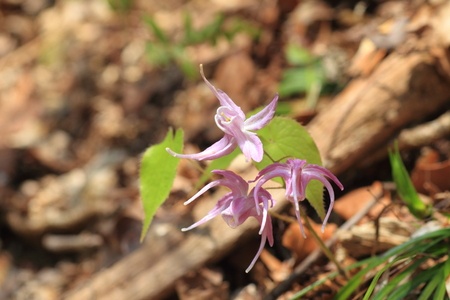Horny Goat Weed – Epimedium sagittatum

Common Names: Horny Goat Weed, Birdwing, Barrenwort, Epimedium sagittatum, Epimedium brevicornum, Epimedium grandiflorum, Epimedium koreanum, Epimedium violaceum, Bishop’s Hat, Yin Yang Huo, Fairy Wings, Randy Beef Grass, Rowdy Lamb Herb, Japanese Epimedium, Xian Ling Pi, Épimède, Herbe Cornée de Chevre, Épimède à Grandes Fleurs, Épimède du Japon, Herba Epimedii, Hierba de Cabra en Celo, Barren, Global Epimedium, Latin Epimedium, Origin Epimedium
Latin Name: Epimedium sagittatum
Origin: Asia
Short Introduction
Horny Goat Weed is a perennial, evergreen herb that thrives in sheltered spots with moist, nutrient-rich soil. Popular among gardeners, especially for rock gardens, it rewards you with its graceful, airy growth pattern as long as it receives regular care such as fertilizing and loosening the soil.
Detailed Description
The Herb of the Lustful Goat
Botanical Information
Horny Goat Weed is an evergreen perennial herb with a delicate, refined appearance. The plant features distinctive elongated heart-shaped leaves and very small flower clusters that can appear in various colors. Horny Goat Weed grows in tight clumps, making it a favorite for use in rock gardens and ornamental plots.
Origin and Distribution
Epimedium sagittatum originates from the forests of China and Japan and has been a key ingredient in traditional Chinese medicine for centuries. Its use in healing is linked to an ancient legend where goat herders observed increased sexual activity among goats grazing on Epimedium. This discovery encouraged people to try the herb themselves, and today, Horny Goat Weed competes confidently with commercial supplements for similar uses.
Usage / Dosage
In Chinese legend, the plant is called ‘yin yang huo,’ which roughly translates as ‘horny goat weed.’ Goat herders observed that their animals displayed a remarkable increase in sexual activity after consuming the plant. Worldwide, Epimedium extracts appear in many forms, including tablets and as the raw herb. The plant contains an active compound called icariin, which pharmacologically acts as a phosphodiesterase-5 (PDE-5) inhibitor—the same mechanism as most prescription medications for erectile dysfunction. This effect is detailed further below. In traditional medicine, Horny Goat Weed is believed to dispel 'internal chill' and strengthen the vital energy known as 'qi.'
Animal studies confirm increased nitric oxide concentrations, which act as a smooth muscle relaxant, with observed effects on tissue relaxation in rabbits. Other research found that topical application of Epimedium extract raised blood pressure and improved erections (again, in animal models). In vitro studies have shown that icariin inhibits PDE-5, much like sildenafil (Viagra) and vardenafil (Levitra), though at different dosage levels. While there are few sources specifying the ideal oral dosage, some research suggests fewer side effects compared to pharmaceuticals—likely due to lower specificity.
Horny Goat Weed appears frequently in traditional remedies for erectile dysfunction and reduced libido, either alone or in herbal blends. In Chinese medicine, it is regarded as a potent aphrodisiac for both men and women, used for male impotence, male and female infertility (thought to be more effective in men by supporting sperm production), and to enhance reproductive health. Additionally, this herb promotes gene expression that boosts nitric oxide synthesis and modulates the balance between adenosine and guanosine monophosphates, further supporting sexual health. Icariin seems to specifically inhibit PDE-5 activity with less impact on other phosphodiesterases and cyclic AMP diesterase (cAMP-PDE).
Studies in tissues, animals, and humans (a total of six published studies) reveal that icariin helps stimulate osteoblast activity in bone tissue, potentially slowing the progression of osteoporosis. It has also shown benefits for bone protection and cholesterol reduction in postmenopausal women (over a 6-month period). In older men, Horny Goat Weed blends are sometimes recommended for prostate health.
In combinations, the herb is used for ailments like poor cerebral blood flow, to increase nerve sensitivity in the skin and limbs, as a gentle stimulator of the central nervous system, and as a nerve tonic. Some herbalists value Horny Goat Weed for its effect on immune system support. In traditional Chinese medicine, smaller doses are often given for fatigue and mental exhaustion.
In folk applications across Southeast Asia, Horny Goat Weed features in blends for poor circulation in the lower limbs, pronounced muscle soreness or stiffness, improved muscle oxygenation and blood flow (boosting performance and endurance), and is recommended for high blood pressure, minor heart issues, tissue support in liver and kidney diseases, bronchitis, as an analgesic/anti-inflammatory for joint pain (especially rheumatic pain), and as an immunostimulant for those with AIDS. For decades, Horny Goat Weed has also been suggested for nicotine-dependent individuals and heavy smokers—to help prevent cold extremities.
Active Compounds
The above effects are primarily due to the glycoside compound icariin. Icariin works similarly to compounds found in commercial sexual-health medications by blocking PDE-5, which causes blood vessels to narrow and reduces blood flow. Excess PDE-5 prevents erection; icariin blocks this enzyme, increases blood flow—especially to the penis—and enriches tissues with oxygen, fighting fatigue and restoring vitality.
Scientists have identified about 37 flavonoid compounds within Horny Goat Weed, with 28 being phenylflavonoids—epimedin C being the dominant one in concentrations of 1.4 to 5.1%. The herb also contains ceryl alcohol, phytosterols, various acids (palmitic, stearic, oleic, linoleic, and linolenic), hentriacontane, bilobanol, magnoflorine, glucose, fructose, and derivatives of benzopyran.
Traditional Dosage
This remarkable herb is traditionally brewed as a tea from crushed leaves. For daily use, steep a full teaspoon of Horny Goat Weed leaves in half a liter of water, simmer for 15 minutes, then strain and sip throughout the day. To enhance the benefits, add a few drops of lemon juice to the boiling water to help release more icariin from the leaves. For powdered bark, take 1 teaspoon stirred into water 1–2 times daily. Capsules containing 100% of the herb are recommended at 2 capsules, 3 times a day; tinctures at 30 drops, 3 times daily. Not recommended for pregnant or breastfeeding women.
